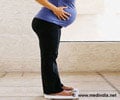
‘Slower calorie burn in pregnancy may mean more retained baby weight in obese black mothers.’
Tweet it Now
Researchers at Louisiana State University's Pennington Biomedical Research Center and the Woman's Hospital in Baton Rouge measured energy expenditure, body composition and markers of metabolic health in 66 black and white pregnant women with obesity.
The women were comparable in age (average age 27), BMI (approximately 37) and body fat percentage (approximately 45 percent). The black women were heavier and had a higher amount of fat-free mass (muscle, bone, skin, etc.), which suggest that they had a higher metabolism and would burn more calories. While the black women ate roughly 300 fewer calories per day, the composition of their diet and daily energy expenditure was similar to their white counterparts. However, when the researchers compared energy expenditure--assuming that body mass was the same in black and white women--they found that black women burned roughly 230 fewer calories during the day and 80 fewer calories while sleeping. The researchers think that the findings may be partly due to the composition of the fat-free mass in black women. Previous research has shown that while black women have a higher proportion of calorie-burning muscle, they may have a smaller liver and kidney, two organs that expend more energy than muscle. "Another hypothesis is that African-Americans are more efficient in the use of energy during activity. This can be compared to a more fuel-efficient car, which consumes less gas for the same performance," lead researcher Jasper Most, PhD, of Pennington Biomedical, explained.
Clinicians commonly recommend that pregnant women add an additional 300 to 500 calories per day and that obese women aim to gain between 11 and 20 pounds during the course of a normal pregnancy. These findings could have implications on current non-race-specific calorie intake recommendations for pregnant women. "The weight gain recommendations for pregnancy are based on weight gain in relation to pregnancy outcomes such as healthy fetal size and in the absence of pregnancy complications. Therefore, our findings cannot immediately contribute to suggestions on healthy weight gain," Most said.
"However, our findings might indeed influence the recommendations for energy intake during pregnancy. The estimated energy-intake requirements to achieve healthy weight gain are the sum of energy that a pregnant woman expends and what she stores (in fat tissue and for fetal growth, for example). "We show that the energy expenditure is less in African-American women and therefore energy intake requirements should probably be smaller for African-American women. We estimate if African-American women eat the amount of calories recommended for pregnant women, they would likely gain more weight in pregnancy (up to 7 kg/15 lbs. more) than what is considered healthy," Most said.
Jasper Most, PhD, of Pennington Biomedical, will present the poster "Propensity for excess gestational weight gain in African-American women may be explained by hypometabolic factors in early pregnancy" on Sunday, April 22, in the Exhibit Hall of the San Diego Convention Center.
Advertisement












